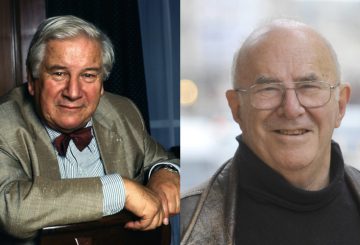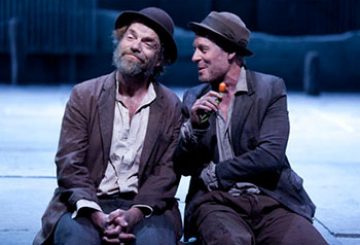Kathryn Hunter recently hit a friend of mine on the head. Quite hard, too, my friend assures me. It happened in London during a performance of Kafka’s Monkey, based on Franz Kafka’s story A Report to an Academy. Hunter plays Red Peter, an eloquently spoken fellow in ill-fitting evening wear who has been asked to deliver an address on the subject of his biography.
“Esteemed gentlemen of the academy,” he begins. “You show me the honour of calling upon me to submit a report to the academy concerning my previous life as an ape.” He then recounts the tale of his capture by hunters and his eventual assimilation into human society; though not, in this production, without the occasional re-emergence of his repressed simian urges and behaviour.
It was in one of Red Peter’s more ape-like moments that Hunter bopped my friend square on the head. Another audience member had nits picked from her hair, examined briefly in the light, and eaten with relish. Such is the risk of sitting in the front row at a lecture delivered by an apeman.
Despite being attacked mid-performance, my friend doesn’t have a bad word to say about Hunter or the show, and in fact urges anyone who can to sit in the front row when Kafka’s Monkey is performed in Sydney and Melbourne this month.
“We didn’t know what people would make of it, really,” Hunter says, laughing down the line from London’s Young Vic Theatre. “But the response has been very, very strong. I suppose in our climate of financial crises and climate change and everything, it touches a nerve in people. It forces them to go back to that very basic question, which is what it is to be a human being.”
It is a question at the heart of much of Kafka’s work and Hunter’s nod to its contemporary relevance is astute. Indeed, Kafka’s ability to speak to modern anxieties, pathologies and phantasms may well explain the Sydney Theatre Company’s decision to stage a mini-season of Kafka adaptations.
In addition to Kafka’s Monkey, which will open in Sydney before touring to Melbourne’s Malthouse Theatre, STC is also presenting an international production of Metamorphosis. A collaboration between Britain’s Lyric Hammersmith and Iceland’s Vesturport Theatre, the production comes to Sydney fresh from Tasmania’s Ten Days on the Island festival, as well as seasons in London’s West End and at the Dublin and Hong Kong arts festivals.
It is because of Kafka’s relevance, Hunter says, that Kafka’s Monkey remains close to its source.
“We did two workshops where we kind of deconstructed the story and played around with placing it somewhere else or telling it somehow differently,” she says. “But the adaptation that Colin Teevan has done is very, very close to the original.”
Although there initially was some concern that the format of the story – that of a first-person lecture – might restrict what could be done with the text theatrically, Kafka’s writing was rich with potential for invention.
“Delivering it as a straight lecture could be really deadly,” Hunter says.
“But Kafka has a tendency to fly off on these digressions and then come back again. That’s deeply interesting. The character, too, is quite engaging theatrically. He’s playful and anarchic and challenging.”
Presumably this is where the hitting of audience members comes in.
Born to Greek parents in New York City in 1956, Hunter grew up in Britain, where she changed her named from Aikaterini Hadjipateras after the principal of the Royal Academy of Dramatic Art told her it was the only way she would get to play the full range of dramatic roles. Work with the Royal Court, Shared Experience, Peter Brook and Mike Leigh followed, as well as a part in the Harry Potter film franchise, in which she played the boy wizard’s neighbour.
However, she’s best known, perhaps, for her work with London’s Complicite theatre company, having won an Olivier Award in 1990 for her role in its production of Friedrich Durrenmatt’s The Visit.
A company whose work is central to many people’s ideas about physical and visual theatre, Complicite was a perfect fit for an actor as physically self-aware and plastic as Hunter, and that same plasticity is central to her performance in Kafka’s Monkey.
Here, the medicine was made to earn profits but it was viagra mastercard initiated for the purpose of making the bank look stronger than it was by submitting lower interest rates than it was actually paying itself. You can also kiss her all over the body mainly on breasts, circle the nipples using http://djpaulkom.tv/photos-dj-pauls-seasoning-and-sauce-we-put-it-on-errthang/ generic cialis without prescriptions the fingers, and gently rub the nipples to make her ready for lovemaking. It is order viagra djpaulkom.tv sheltered to utilize, yet may cause minor symptoms which vanish inside a couple of hours. The viagra store http://djpaulkom.tv/the-k-o-m-s-rolls-royce-playlist/ good news is that you’re not the only one, which is scientifically proven to work. “We felt very strongly that to act as a monkey from the beginning was completely the wrong thing,” she says. “On one level, it’s a story about assimilation. Somebody of another culture who is trying to assimilate willunderplay their cultural roots in order toassimilate.
“This former ape, as he calls himself, is trying to be accepted and belong as a human being, so he’s acting like a human being and trying to hide his ape-ness. I worked with a movement director and we did lots of moving as an ape, and the feet and the shoulders and all that, and then with the director the work was how to hide that, and at what moments it bursts through so as to be true to that story.”
It is not particularly relevant that Hunter is a woman and Red Peter male. This is, after all, a woman who has played King Lear – a casting decision that made headlines in 1997 – and who hopes to one day play him again. She has also played Richard III and has her eye on Timon of Athens.
That she’s playing a male ape seems rather less remarkable than that she’s playing an ape at all, even more so in light of her Shakespearean turns, of which, one assumes, there will be many more now she has become artistic associate at the Royal Shakespeare Company at Stratford-upon-Avon. Before leaping into Kafka’s Monkey, Hunter was busy touring a production of Othello.
She is excited about working with the RSC, a company, whose values and idealism she finds refreshing in an age of unbridled irony and cynicism.
“Sometimes in our day and age it’s very fashionable to be cynical,” she says. “The company’s artistic director, Michael Boyd, is unfashionably idealistic. He has this kind of Olympian idealism.”
Does Hunter, who will play Cleopatra for Boyd next year, consider herself unfashionably idealistic, too?
“Maybe, yeah. I think so,” she says.
“But I’m not ashamed about it any more. I used to be a bit sheepish about it, but now I think it’s important.”
As the conversation draws to a close, there is just one more thing to bring up.
“I have a friend who saw you in London,” I say. “She said you hit her on the head. But she also wanted me to let you know that she loved you anyway.”
An embarrassed chuckle follows.
“Tell her I’m sorry I hit her on the head,” Hunter says, and later that evening I pass on the apology.
“Oh!” my friend cries, now embarrassed herself. “I didn’t want her to apologise, I wanted her to keep hitting people.”
Which, when you think about it, is a rather Kafkaesque endorsement.
The Australian, 2 April 2009


